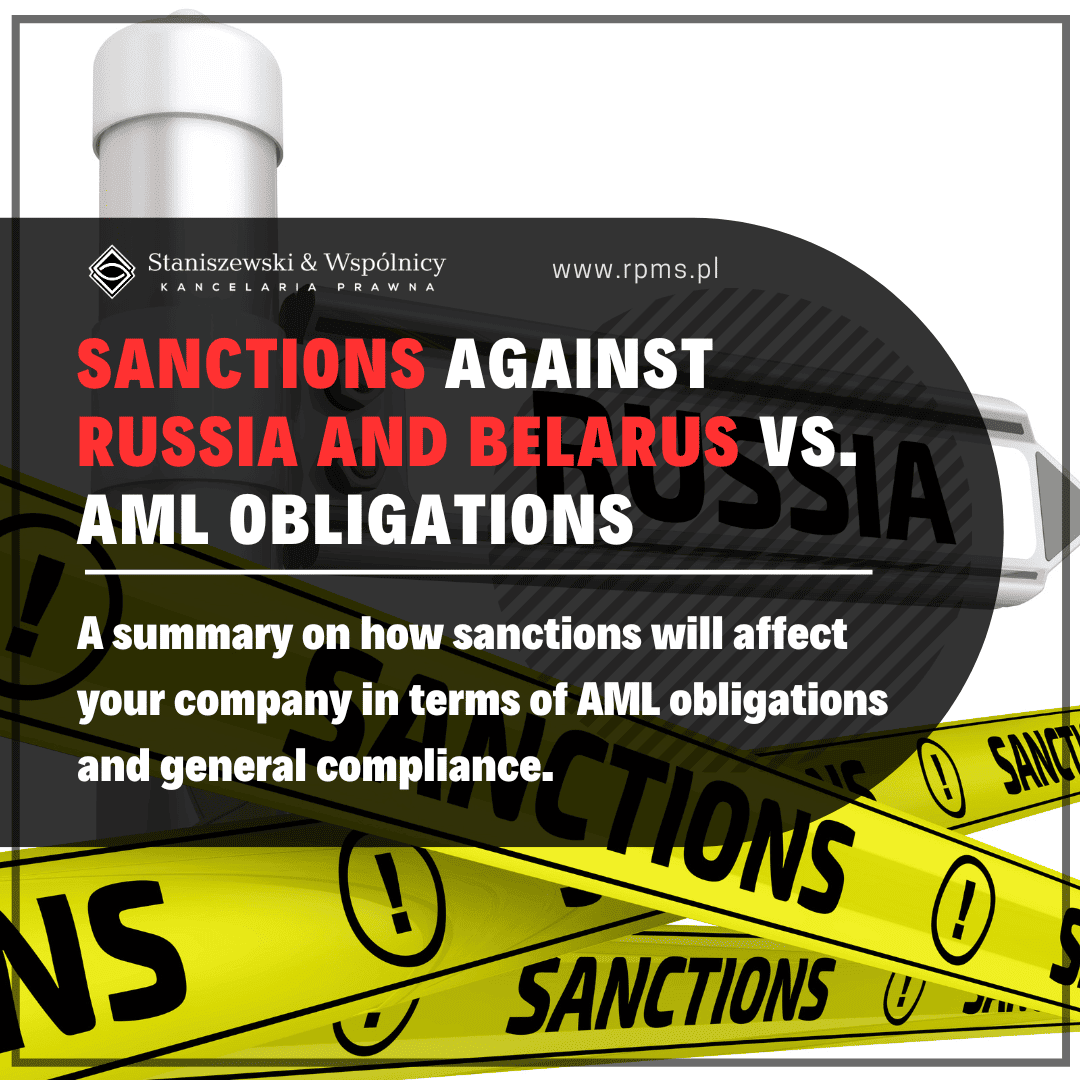Table of contents
What obligations does the AML Act impose on payment institutions in Poland?

The Anti-Money Laundering and Countering the Financing of Terrorism Act imposes numerous obligations on payment institutions and other institutions related to financial services (listed in Article 2 of the AML Act and defined as obligated institutions). Sanctions against Russia and Belarus can have a significant impact on these categories of entities.
What obligations do payment institutions have? First and foremost, they must implement AML procedures, which include Know Your Customer (KYC) procedure for collecting customer information. Payment institutions are obligated to collect data, particularly regarding the identity of their customers, the origin of funds held by customers, and the identification of suspicious transactions. KYC primarily involves acquiring and storing data about counterparties and verifying the accuracy of obtained data against the actual state.
Payment institutions are required to report suspicious transactions to the General Inspectorate of Financial Information (GIIF). Reporting applies not only to suspicious transactions but also to transactions exceeding a certain value. We describe in detail which transactions are subject to reporting and how reporting is carried out in this article.
Sanctions against Russia and Belarus – in which legal acts can they be found?
Sanctions related to the conflict have been imposed against Russia and Belarus at the national and EU levels. The Financial Supervision Authority (UKNF), which exercises comprehensive supervision over the financial market, reminds that EU Council regulations on restrictive measures (sanctions) have direct application in Poland. This means that both EU and national sanctions will be binding for payment institutions.
Sanctions on Russia and Belarus have been introduced, in particular, in the following EU regulations:
- Regulation (EU) No 269/2014 of March 17, 2014, concerning restrictive measures in respect of actions undermining or threatening the territorial integrity, sovereignty and independence of Ukraine.
- Regulation (EU) No 833/2014 of July 31, 2014, concerning restrictive measures in view of Russia’s actions destabilizing the situation in Ukraine.
- Regulation (EU) No 765/2006 of May 18, 2006, concerning restrictive measures in view of the situation in Belarus and the involvement of Belarus in the Russian aggression against Ukraine.
- Regulation (EU) No 692/2014 of June 23, 2014, concerning restrictive measures in response to the illegal annexation of Crimea and Sevastopol.
- Regulation (EU) No 2022/263 of February 23, 2022, concerning restrictive measures in response to the illegal recognition, occupation or annexation by the Russian Federation of certain non-government controlled areas of Ukraine.
As mentioned above, restrictions have also been introduced in the Polish Sanctions Act, April 13, 2022, concerning specific measures to counter support for aggression against Ukraine and to protect national security.
What sanctions have been introduced for entities related to Russia and Belarus? Traditionally, it is assumed that the sanctions cover four areas:
- Individual sanctions,
- Economic sanctions,
- Media restrictions,
- Diplomatic measures.
For payment institutions, the most relevant will undoubtedly be economic sanctions and potentially individual sanctions. In this regard, the exclusion of Russia from the SWIFT system, the ban on delivering euro banknotes to Russia and Belarus, and the freezing of assets of certain politicians and oligarchs (the current list of sanctioned individuals can be found on the EU Council’s website and the gov.pl website) are currently in effect.

What do payment institutions need to implement (concerning sanctions)?

Undoubtedly, many oligarchs and individuals subject to sanctions will try to conceal their assets and operate through other legal entities (e.g., capital companies), in which complex ownership structures can hinder the identification of the ultimate beneficiary.
The Financial Supervision Authority points out specific sanctions to which payment institutions should pay particular attention. These include:
- Prohibition of providing intermediary services or other services and financing or financial assistance in connection with the supply, production, maintenance, and use of goods and technologies subject to a sales prohibition or delivery prohibition on behalf of sanctioned entities.
- Prohibition of granting, financing, or providing financial assistance, as well as insurance and reinsurance, related to the import of goods from non-government-controlled Ukrainian territories to the EU.
- Prohibition of accepting deposits from Russian or Belarusian citizens or individuals residing in Russia or Belarus with a value exceeding 100,000 EUR.
- Prohibition of direct or indirect purchase, sale, provision of investment services, or assistance in issuing or any other activities related to specific marketable securities and money market instruments.
- Prohibition of transactions related to managing reserves and assets of the Central Bank of Russia or the Central Bank of Belarus.
- Prohibition of conscious and deliberate participation in actions aimed at circumventing prohibitions specified in sanctions regulations.
It should be noted that the above list of significant sanctions relevant to payment institution activities is purely illustrative, and all current sanctions can be found on government websites and the UKNF website.
Sanctions form – is it mandatory in Poland?
UKNF has requested payment institutions to provide information related to sanctions risk (answering questions following the Sanctions Questionnaire). The deadline for submitting the questionnaire was June 7, 2022, and in interpreting Article 101(1) of the Payment Institutions Act, it should be noted that submitting the questionnaire is the payment institutions’ obligation. UKNF requested to improve supervision over the financial market and enable consistent application of sanctions in Poland.
To ensure a broad certainty of transactions in the financial market, payment institutions should have submitted the sanctions form to UKNF. Nevertheless, as a principle, the failure to submit the form within the specified timeframe should not result in adverse legal consequences for payment institutions.
Furthermore, the imposition of sanctions in legal transactions may require the implementation of changes related to Article 27 of the AML Act. According to the mentioned provision, payment institutions must identify and assess the risks associated with money laundering and terrorist financing concerning their activities, considering risk factors related to customers, countries or geographical areas, products, services, transactions, or supply channels. There is no doubt that the introduction of sanctions may require changes to risk assessment (based on the guidelines from Article 27 of the AML Act) and KYC procedures in payment institutions (the institution must at least supplement KYC procedures with the principles of checking sanctions lists and updating them for ongoing operations).

Summary

From the above text, it is clear that the introduction of sanctions on entities from Russia and Belarus has a significant impact on the activities of financial institutions. However, sanctions regulations are frequently updated, and their interpretation can pose challenges. Financial institutions can benefit from legal firms specializing in financial law for assistance in the practical application of regulations.
FAQ
Identifying whether a given entity is subject to sanctions is generally the most challenging aspect of implementing legal acts restricting the ability to serve entities from Russia and Belarus. Helpful tools in this regard may include: identifying the ultimate beneficial owner and the CRBR register. Additionally, a lawyer specializing in financial law can assist payment institutions in interpreting the law.
Every payment institution must implement sanctions in its operations. Failure to fulfill obligations or violating the prohibitions specified in sanctions regulations could lead to administrative and criminal liability, as defined in Articles 6 and 15 of the Sanctions Act.
In the initial phase of sanctions implementation, some entities raised concerns about being wrongly included in the sanctions list and not having any connection to Russia or Belarus. It would be safest for payment institutions to implement sanctions until discrepancies are resolved, and the entity is removed from the sanctions list.”














